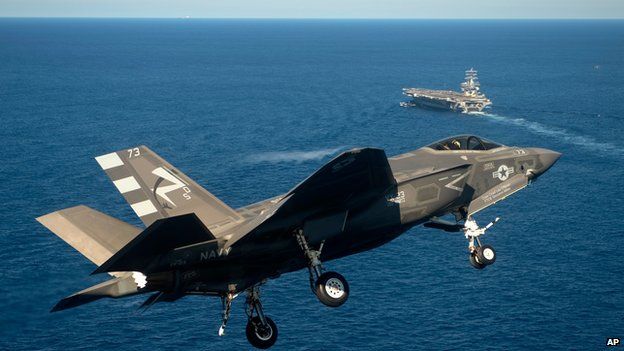Australia fighter jet data theft 'shows cyber-spy risk'
- Published

The reported theft by Chinese spies of designs for Australia's new warplane, the US-built F-35 Joint Strike Fighter jet, highlights the risk of cyber-espionage, an Australian minister said.
Foreign Minister Julie Bishop also told Sky News she was confident that the US would guard its intellectual property.
She was responding to media reports, citing leaked US documents, of the theft of a huge amount of F-35 data.
Australia has ordered 72 F-35 jets, due to come into service in 2020.
However, China has forcefully denied stealing the designs.
The F-35 is the most expensive defence project in US history. The stealth aircraft, manufactured by US-based Lockheed Martin, was developed at a cost of around $400bn (£230bn), in a process dogged by delays and unforeseen costs.
The US, British and Australian militaries are among the major customers for the jet. Australian and British firms have also been involved in manufacturing parts of the aircraft.
Billion-dollar deal
A report by Australia's Fairfax Media says China stole "many terabytes of data" for the new aircraft, according to documents leaked by Edward Snowden, a former intelligence contractor who worked at the US National Security Agency (NSA).
The report cites documents posted by German magazine Der Spiegel, which has access to NSA files leaked by Mr Snowden.
In 2013, US newspaper The Washington Post said Chinese hackers had accessed sensitive documents about several US weapons projects, including the F-35.
Fairfax Media says the latest documents detail the scale of the breach, indicating that Chinese cyber-spies acquired the designs for the F-35's radar, engine and exhaust cooling systems.
The Australian government has ordered 72 of the new jets, with an option to increase the order to 100, in a deal worth billions of dollars.
Ms Bishop told Sky News that the report "does highlight the challenges of cyber attacks".
However, she said, she was "confident that the United States has taken measures to ensure its intellectual property is protected".
Mr Snowden leaked a vast tranche of information to the media in 2013, revealing the scale of internet and phone surveillance carried out by US intelligence agencies.
He left the US, where he faces espionage charges, and currently lives in Russia.
China's Foreign Ministry spokesman Hong Lei has denounced the accusations as being "baseless".
"The materials disclosed by the relevant person showed that some countries do not have good records to talk about when it comes to cyber-attacks," he said.
"We hope that instead of pointing fingers at other countries for no reason and cooking up stories, they should demonstrate a cooperative attitude and work with us to guard against cyber-attacks."
- Published28 May 2013
- Published28 May 2013
- Published22 February 2013
- Published17 January 2014
- Published16 December 2013